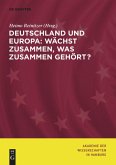The history of European integration has always known "external states" that did not want or were not able to join the process of European integration. The EU might indeed not be seen as attractive: Since 2008, it has had to face many crises, first the financial crisis, then the migration and Schengen crises in 2015, and finally the "leave" vote in Great Britain in 2016, the so-called "Brexit". Euro-skepticism has continually increased in EU-member states as the rejection of various EU treaties proved. On national as well as EU levels, the strength of anti-European parties has grown. The present volume, edited by Birte Wassenberg and Patrick Moreau, concentrates on these "external states", particularly their attitude towards Europe. By looking at the geopolitical context, a wide range from historical constants to a changing of attitudes is shown and proves that the EU remains a fundamental actor of European politics and that its attraction continues to be very powerful.




